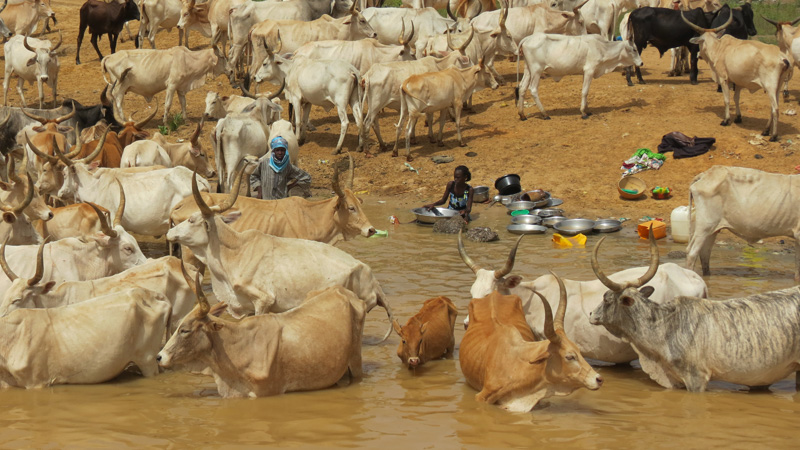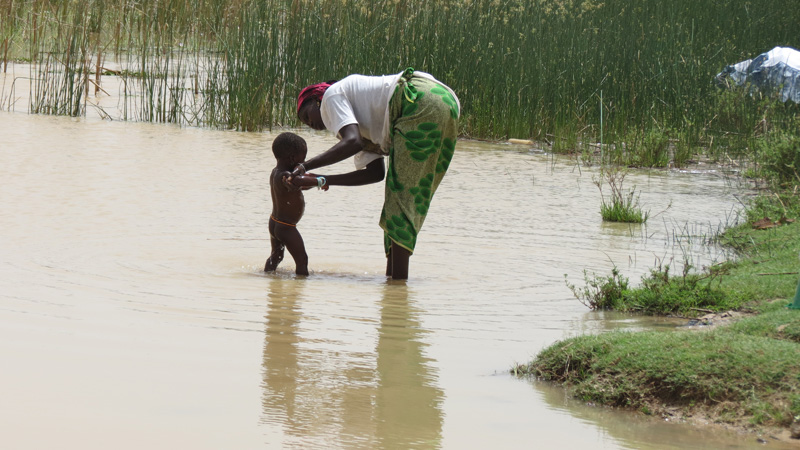New award-winning RVC research reveals the importance of a One Health approach if elimination of a major parasitic disease is to be achieved
A new study published in Lancet Planetary Health led by the Royal Veterinary College (RVC), working in partnership with the Université Gaston Berger and Université Cheikh Anta Diop in Senegal and beyond, reveals the importance of a One Health approach if elimination of schistosomiasis, a parasitic disease, is to be achieved in sub-Saharan Africa.
This study, which also won the PhD McKeever Prize for scientific quality and potential impact on animal health, highlights how viable zoonotic hybridisation between parasites of humans with those of animals, together with wider ecosystem contexts, can affect the transmission and resilience of the disease.
Schistosomiasis is a disease caused by parasitic schistosome worms and is transmitted via contact with open water sources which contain the intermediate host, an aquatic snail. Second only to malaria in terms of socioeconomic impact, schistosomiasis predominantly affects the world’s poorest communities and is of profound global medical and veterinary importance.

Classified by the World Health Organisation (WHO) as a Neglected Tropical Disease, schistosomiasis has, until very recently, been neglected in terms of treatment, research and financial support. Efforts to control human schistosomiasis have begun to achieve significant success in many countries. However, what has remained almost completely overlooked globally is that this disease can also affect animals, including livestock, which the most affected rural communities often depend on for their livelihoods. Furthermore, previous studies, including by this team of researchers, have found that these animal schistosome species can successfully hybridise with human schistosomes, to provide a potential ultimate challenge of zoonotic transmission.
Over a three-year period, the research, led by Professor Joanne Webster, Professor of Parasitic Diseases at the RVC, and conducted in partnership with the Université Gaston Berger and Université Cheikh Anta Diop in Senegal, evaluated the multi-host, multi-parasite transmission cycle of Haematobium group schistosomiasis from Richard Toll and Lac de Guiers; and Barkedji and Linguere, two main regions with Northern Senegal, West Africa, making this the most comprehensive schistosomiasis multi-parasite and multi-host study performed within Africa to date.
The researchers examined the prevalence and intensities of Schistosoma haematobium in humans, previously assumed to be the only agent of human urogenital schistosomiasis, Schistosoma bovis and Schistosoma curassoni, causative agents of intestinal schistosomiasis in livestock, and the existence and dynamics of these viable zoonotic hybrid schistosomes between species of humans and livestock.
The results show that the prevalence of schistosomiasis in humans in these regions remained extremely high, despite almost 20 years of concerted disease control activities through mass drug administration (88% of children were infected, with 72% of these shedding zoonotic hybrids between S. haematobium with S. bovis). Adults, who are usually considered low risk, also exhibited high prevalence (79% in Richard Toll, with 88% of infected samples containing S. haematobium with S. bovis hybrids).
Schistosomiasis was also found to be highly prevalent in the local livestock populations, at 94% for S. bovis amongst Richard Toll cattle, and 73% of sheep and 84% of goats infected with S. curassoni in the Barkedji and Linguere regions. Whilst hybrids between the livestock schistosome species of S. bovis with S. curassoni were also detected, hybrids between S. haematobium and S. bovis were not found in these animals.

The local freshwater snail populations, which re-infect human and animal hosts, also demonstrated a high prevalence of hybrid schistosome infection, with up to 35% of infected snails found to be shedding hybrids of S. haematobium and S. bovis in some regions.
These findings highlight the impact that hybridisation, evolving host ranges and wider ecosystem contexts can have on the transmission dynamics of schistosomiasis. In these African ecosystems, if the control and elimination of this debilitating disease is to be successfully achieved, infection of livestock cannot be ignored, and a One Health approach, that recognises the interconnection between people, animals, plants and the shared environment, must be adopted.
Professor Jonathan Elliott, Vice Principal (Research and Innovation) at the RVC, said: “Professor Webster’s team, through their rigorous and detailed excellent research, have uncovered a really important phenomenon with major implications for schistosomiasis control programmes. These need to consider the whole ecosystem where people and animals share the same environmental and its resources. This work exemplifies how important a ‘One Health’ approach is to the control of infectious diseases, such as schistosomiasis.”
Dr Amadou Djirmay Garba, Scientist of Preventative Chemotherapy and Transmission Control and Control of Neglected Tropical Disease at WHO, said: “Congratulations for this important article on human and animal schistosomiasis and their interactions. It is a great contribution to the evidence gathering on the high morbidity still present in this area where nearly 90% of the children are infected despite more than 20 years of control interventions. It also highlights the high proportion of hybrids among human infections and the issue of animal contribution to the transmission of S. haematobium.”
Dr Christine Thuranira-McKeever, Director of Distance Learning Programmes at the RVC, said: “I am delighted to see this work receive the McKeever prize, which recognises scientific excellence and impact in research. This excellent research highlights the importance of a One Health approach in efforts to combat neglected tropical diseases such as schistosomiasis, which have a devastating effect on human and animal health in livestock keeping communities. The findings of this work add great value to the understanding of the transmission of the disease and will help shape future interventions.”
Research reference
Leger, E., Borlase, A., Fall, C-B., Diouf, N.D., Diop, S.D., Yasanev, L., Catalano, S., Thiam, C.T., Ndiaye, A., Emory, A., Morrell, A., Rabone, M., Ndao, M., Faye, B., Rollinson, D, Rudge, J.W., Sene, M. & Webster, J.P. (2020) Prevalence and distribution of schistosomiasis in human, livestock and snail populations in northern Senegal: a One Health epidemiological study of a multi-host system. The Lancet Planetary Health, 4 (8), E330-342.
Notes to Editors
For more information please contact:
- Jasmin De Vivo (Jasmin.DeVivo@plmr.co.uk)
- Press Line: 0800 368 9520
About the RVC
- The Royal Veterinary College (RVC) is the UK's largest and longest established independent veterinary school and is a Member Institution of the University of London. It was the first in the world to hold full accreditation from AVMA, EAEVE, RCVS and AVBC.
- The RVC is the top veterinary school in the UK and Europe, and ranked as the world’s second highest veterinary school in the QS World University Rankings by subject, 2020.
- The RVC offers undergraduate and postgraduate programmes in veterinary medicine, veterinary nursing and biological sciences.
- In 2017, the RVC received a Gold award from the Teaching Excellence Framework (TEF) – the highest rating a university can receive.
- A research led institution with 79% of its research rated as internationally excellent or world class in the Research Excellence Framework 2014.
- The RVC provides animal owners and the veterinary profession with access to expert veterinary care and advice through its teaching hospitals and first opinion practices in London and Hertfordshire.
You may also be interested in:
-
New One Health textbook empowers learners to take integrated approach to address health challenges
A new textbook called Principles of One Health for a better planet, edited by leading researcher …

